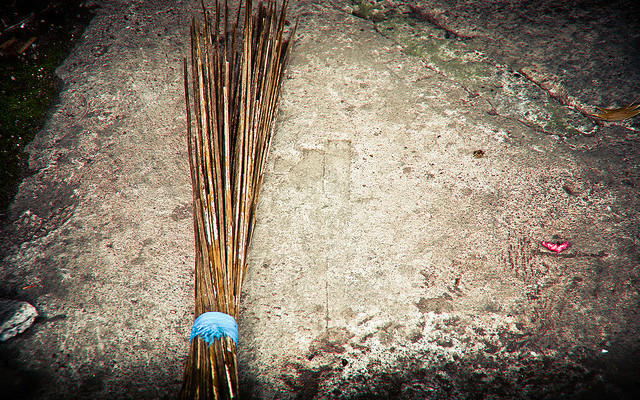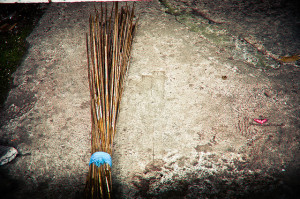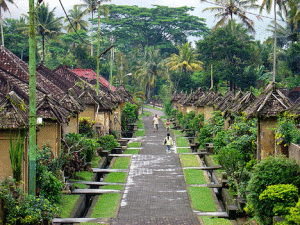By: Jane Patten
|
Several weeks ago, my Balinese husband, son and I moved into our almost-finished new house in a village in Gianyar, Bali. The setting is picturesque: a hamlet in a stretch of paddy fields, rows of coconut trees sloping gently towards the sea, a twinkling of which can be glimpsed to the south, and the imposing grandeur of Mount Agung to the northeast. Dawns and sunsets are stunning, and at night the Milky Way glows bright, far from town lights. But when walking in the neighborhood, north towards the village meeting hall or south past the paddy fields, one can’t miss the heaps of plastic garbage-bags, shampoo sachets, snack packaging, bottles-lining the road and strewn in the irrigation ditches. The local farmers say that it often flows into the fields, gets ploughed in and strangles the roots of the rice and other crops. When they find it clogging up the flow, they drag it out onto the road. I’ve also seen them simply move it to another fork of the channel-someone else’s problem down the line-or use it, along with branches and leaves, to dam up a channel, redirecting the irrigation water. The neighbors insist this plastic garbage comes from upstream. But I see local children and adults throwing all kinds of garbage onto the road, into the water channels, in their yards, our yard, over the wall, anywhere. Isn’t Bali supposed to be ‘BALI’-Bersih (clean), Aman (safe), Lestari (everlasting) and Indah (beautiful)-as the slogan goes? Now that we are in our own house and full members of the local community, we feel the strong sense of both rights-to a clean and safe environment-and responsibility-to do our part to create and sustain such an environment. When we first moved in, my husband had to travel for work and I was left facing several hundred square meters of barren land. After more than four months of construction, junk of every description had been scattered over the surface and buried several inches deep. My western-bred reaction was to collect and group it, and then reuse, recycle or compost as much of it as possible, finding a way to dispose of the rest in an environmentally friendly manner. I put aside things that might be useful later: wood, piping, broken bricks, etc. I gathered recyclables, bagged messy garbage and collected rubble into a mountainous pile by the front gate. For weeks I was pick-axing cement chunks, rummaging through dirt and ashes with my fingers for rusty nails, and carting wheelbarrow loads back and forth, all to the bemusement of the neighbors. Sometimes my attention drifted on catching sight of the muddy plastic garbage littering the road and water channel just outside. I grabbed up fistfuls of it. A woman rode by on her bicycle once, clucking, ‘Dirty hands!’ Dirty? Let’s talk about dirty! ‘Dirty road!’ I replied in bafflement, ‘Would you like to help?’ She giggled as she rode on her way. After a week or so, my mother-in-law, from eastern Bali, came to stay. She was obviously mortified by the state of our yard. After giving her grandson a squeeze, she immediately set to sweeping the whole place-something that admittedly had not yet crossed my mind. In front, she brushed up pebbles and cigarette butts, weeds and plastic bag scraps, nails and clods of earth, and dumped them all onto the pile of rubble near the front gate. In the backyard, she swept everything onto the remains of an open fire. This had obviously been used by the workmen to burn garbage, for it was full of the (scorched but not incinerated) remnants of large chunks of wood, cement bricks and tiles, wire and plastic casing, tin cans and iron bars. I must admit the yard looked ‘cleaner’ when Meme had finished her sweeping-leaving that distinctive mark of the sapu lidi broom from corner to corner-a clear sign to all that effort had (finally) been taken to neaten things up. In my tidying frenzy, I had neglected the general Balinese rule that one should sweep everything from the ground into its allotted corner at least twice a day (in between, random strewing of waste is normal). Still, the sweeping alone did not appease all neighbors. One morning as we stood at the gate, resting and admiring the paddy fields, two elderly ladies walked by carrying loads of firewood. Seeing a Balinese face with the new resident tamu (visitor), one of them directed a comment at my mother-in-law reprimanding us for not cleaning up the driveway: ‘What’s that messy grass doing, growing wild! It wants a good hoeing!’ I was exasperated-with all the mess inside and outside our yard, this was certainly nowhere near my ‘to do’ lists. After the grumbling ladies had moved off, Meme soothed me with a ‘they don’t understand anything,’ and the next day she had dutifully hoed the offending greenery, leaving more bare earth. Clean, I was reminded, is bare, swept floors and ground, and tidy gardens, free of visible used, messy, discarded or stepped-on flotsam and jetsam of any kind, including unruly grass. So the ground got cleaner and my piles of junk grew-now what to do? The pile of rubble was taken to a dump in a neighboring village where, I was assured, it was needed to fill land for construction projects. Organic waste I could compost. But what about the rest, including our own household recyclables and waste, and what about the mess all along the road? I decided to ask an authority, the Klian Dusun (sub-village head), Pak Nyoman. I took the opportunity one day when he hopped over our back wall adjacent to his land with a bundle of fresh-picked kangkung spinach for us. The roadside litter he blamed on the lack of community awareness, especially in those villages upstream. To sort it out would require a meeting among the heads of the traditional water associations (subak) of all the villages involved-a complicated and unlikely event. Regarding household waste, he asked, ‘Can’t you just burn it?’ He explained that the villagers are encouraged to tidily gather and burn all their garbage. The ashes are good carbon fertilizer, he added. Bottles, cans and paper he offered to take: large glass bottles to the villagers who make and sell coconut oil; the rest up to the village center to leave for the pemulung. These people usually come by with carts, picking up discarded reusables and recyclables to sell. As in many parts of Bali, they are not allowed into my neighborhood. Pak Nyoman explained that pemulung are generally Javanese and some are not to be trusted as they may pick up more than your recyclables, like perhaps your rubber sandals or the bucket you put your garbage in. He told me that the nearby housing complex probably has its garbage picked up by the government’s Department of Sanitation and Parks (DKP). Perhaps they would come to my house? Perhaps…and maybe they might also be interested in cleaning up the road? I decided to look into it. |
First published in Latitudes Magazine














